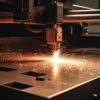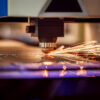The food and beverage industry is one of the most demanding sectors, requiring not only high-quality products but also equipment and components that meet rigorous standards. From processing machinery to packaging solutions, every aspect of production must adhere to strict hygiene and safety regulations. This is where laser cutting and fabrication services play a crucial role, providing the precision, efficiency, and versatility needed to meet these stringent requirements.
In this article, we will explore the significance of laser cutting and fabrication in the food and beverage industry, highlighting how these advanced technologies contribute to the production of reliable, high-quality equipment and components.
The Role of Laser Cutting in the Food and Beverage Industry
Precision and Accuracy
One of the most significant advantages of laser cutting in the food and beverage industry is the unparalleled precision it offers. Laser cutting technology uses focused beams of light to cut materials with extreme accuracy, allowing for the creation of intricate designs and complex shapes that would be difficult or impossible to achieve with traditional cutting methods.
In the food and beverage industry, where even the smallest imperfection can lead to contamination or equipment failure, this level of precision is critical. Whether it’s cutting stainless steel for processing equipment or creating custom components for packaging machines, laser cutting ensures that every piece meets exact specifications.
Hygiene and Cleanliness
Hygiene is paramount in the food and beverage industry, and laser cutting technology excels in this area. The laser cutting process produces clean, smooth edges without burrs or rough surfaces, reducing the risk of bacteria buildup. This is particularly important for components that come into direct contact with food products, as it helps maintain the highest standards of cleanliness and safety.
Additionally, laser cutting minimizes the need for secondary finishing processes, such as grinding or polishing, which can introduce contaminants into the manufacturing process. By reducing these additional steps, laser cutting helps maintain a sterile production environment.
Versatility in Material Handling
The food and beverage industry uses a wide range of materials, from stainless steel and aluminum to plastics and composites. Laser cutting is highly versatile and can handle various materials with ease, making it an ideal choice for manufacturing a diverse array of components and equipment.
For example, stainless steel is commonly used in food processing equipment due to its corrosion resistance and ease of cleaning. Laser cutting can precisely cut stainless steel sheets into complex shapes required for machinery, conveyor systems, and other equipment used in food production.
Customization and Flexibility
The food and beverage industry often requires customized solutions to meet specific production needs. Laser cutting technology offers the flexibility to create custom components and parts quickly and efficiently. Whether it’s producing small batches of specialized equipment or making adjustments to existing designs, laser cutting allows manufacturers to respond rapidly to changing demands.
This flexibility is particularly valuable in the food and beverage industry, where production processes can vary widely depending on the type of product being produced. With laser cutting, manufacturers can easily adapt to these variations, ensuring that their equipment and components are perfectly suited to their specific applications.
The Role of Laser Cutting in the Food and Beverage Industry
While laser cutting is essential for creating precise components, fabrication services are equally important in assembling these components into functional, reliable equipment. Fabrication involves various processes, including welding, bending, and assembling, to create finished products that meet the unique needs of the food and beverage industry.
Structural Integrity and Durability
Fabrication services ensure that the components created through laser cutting are assembled into structures that are not only functional but also durable. In the food and beverage industry, equipment is often subjected to harsh conditions, including exposure to moisture, chemicals, and temperature variations. Fabrication processes such as welding and bending help create robust structures that can withstand these challenges and provide long-lasting performance.
For example, stainless steel tanks used in food processing must be fabricated to withstand pressure, corrosion, and frequent cleaning. Proper fabrication techniques ensure that these tanks maintain their structural integrity over time, reducing the risk of leaks or failures.
Compliance with Industry Standards
The food and beverage industry is governed by strict regulations and standards, particularly concerning hygiene and safety. Fabrication services play a crucial role in ensuring that equipment and components comply with these standards.
For instance, welding processes must be performed with precision to prevent gaps or crevices where bacteria could thrive. Additionally, the materials used in fabrication must be compatible with food-grade requirements, ensuring that they do not react with food products or release harmful substances.
By working with experienced fabrication professionals, manufacturers in the food and beverage industry can ensure that their equipment meets all relevant standards and regulations, providing peace of mind and minimizing the risk of compliance issues.
Efficiency in Production
Fabrication services contribute to the efficiency of production processes in the food and beverage industry. By assembling components accurately and efficiently, fabrication helps minimize downtime and ensure that equipment operates smoothly.
For example, conveyor systems used in food processing must be fabricated with precision to ensure that they function seamlessly and efficiently. Any misalignment or defect in the fabrication process can lead to operational issues, such as jams or delays, which can disrupt production and lead to costly downtime.
Custom Fabrication Solutions
Just as with laser cutting, customization is a key advantage of fabrication services in the food and beverage industry. Every production facility has unique requirements, and off-the-shelf solutions may not always meet these needs. Custom fabrication allows manufacturers to design and build equipment that is tailored to their specific processes, improving efficiency and productivity.
Whether it’s creating custom frames for processing machines or fabricating unique fixtures for packaging lines, custom fabrication ensures that every piece of equipment is designed to optimize performance and meet the unique demands of the food and beverage industry.
The Role of Laser Cutting in the Food and Beverage Industry
Laser cutting and fabrication services are used in a wide range of applications within the food and beverage industry. Some of the key areas where these technologies are applied include:
1. Food Processing Equipment
- Cutting and fabricating stainless steel components for mixers, blenders, and conveyors.
- Creating custom parts for specialized processing equipment, such as slicers and grinders.
2. Packaging Machinery
- Fabricating frames, brackets, and enclosures for packaging machines.
- Cutting precise components for sealing and labeling equipment.
3. Storage and Handling Solutions
- Fabricating stainless steel tanks, hoppers, and silos for storing raw materials and finished products.
- Creating custom shelving, racks, and carts for efficient storage and handling.
4. Conveyor Systems
- Cutting and fabricating conveyor belts, rollers, and frames.
- Customizing conveyor systems to fit specific production lines and processes.
5. Sanitation and Cleaning Equipment
- Fabricating components for cleaning and sanitation systems, such as spray nozzles and washing stations.
- Ensuring that all equipment meets strict hygiene standards.
Laser cutting and fabrication services are indispensable to the food and beverage industry, providing the precision, durability, and customization needed to produce high-quality equipment and components. By leveraging these advanced technologies, manufacturers can ensure that their products meet the rigorous standards of hygiene, safety, and efficiency required in this demanding industry.
Whether it’s creating intricate components for processing machinery or fabricating robust structures for packaging lines, laser cutting and fabrication are essential tools for success in the food and beverage industry. As the industry continues to evolve, these technologies will play an increasingly important role in driving innovation and maintaining the highest levels of quality and safety.







